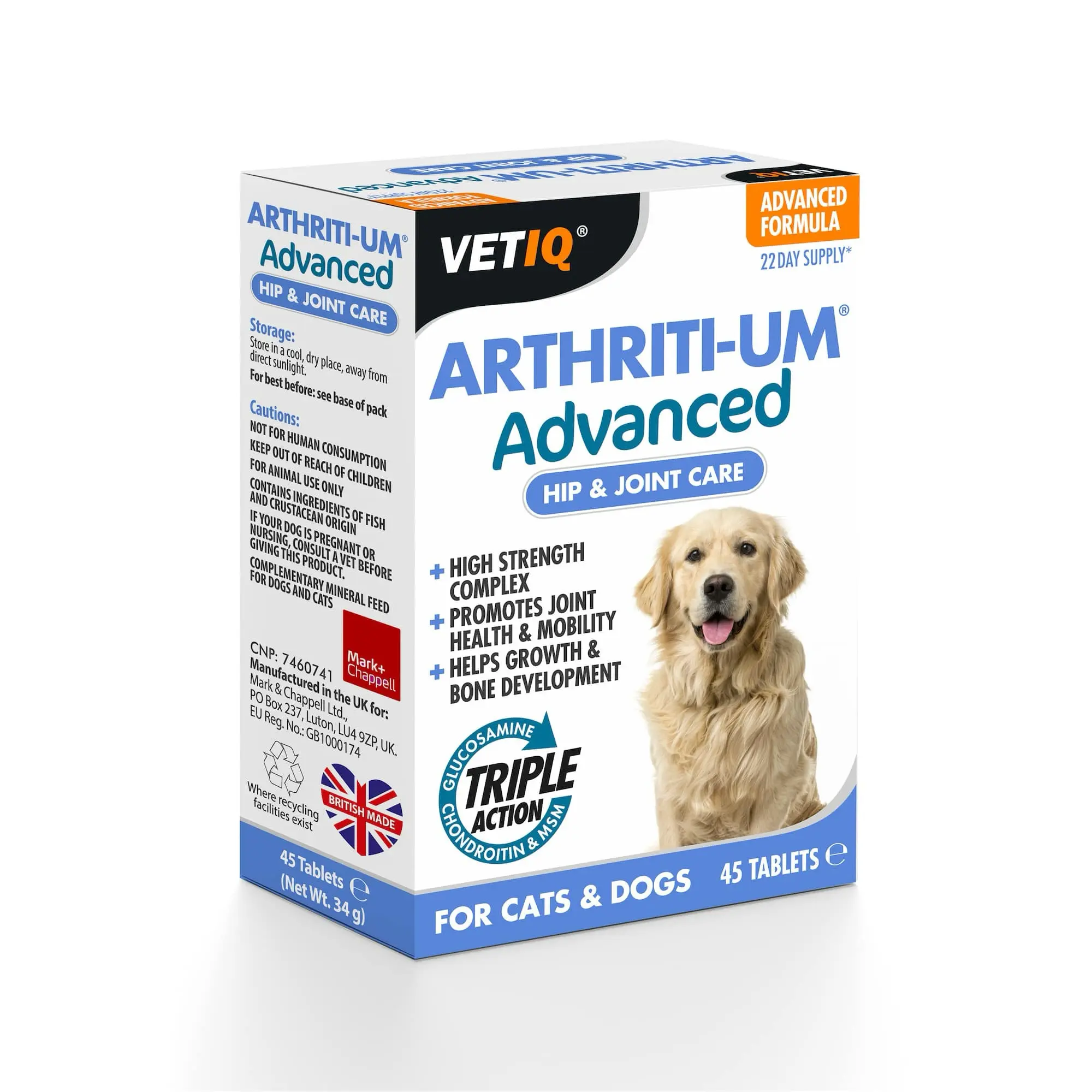As a pet owner, it can be difficult to accept that our pets go through the same ageing process as we do, and unfortunately, arthritis in older pets is certainly part of that journey.
While our pets are probably less concerned with having grey hair than us humans, a more uncomfortable aspect of ageing is that their bodies undergo natural wear and tear as the years go by. The effects of ageing can often be accelerated by the onset of what is commonly known as arthritis. Arthritis in older pets can lead to stiffness, reduced mobility, and discomfort, impacting their overall quality of life.
While arthritis is a progressive condition, there are practical steps pet owners can take to manage symptoms, support joint health, and keep their furry companions as comfortable and active as possible.
In this guide, we’ll explain the key signs that your pet may be suffering from arthritis and we share some effective ways to care for pets throughout their senior years.
Understanding arthritis in older pets
In medical terms, arthritis is a degenerative joint condition that causes inflammation, pain, and stiffness. It typically affects senior dogs and cats, but younger pets can also develop arthritis due to injury, genetics, or long-term stress on the joints. Certain canine breeds such as Labradors, German shepherds, golden retrievers, Rottweilers, springer spaniels and Bernese Mountain are more susceptible to this condition. And of course, pets that are carrying a lot of extra weight can develop arthritis at an earlier age due to the increased strain on their joints.
The most common form is osteoarthritis, which occurs when the protective cartilage in the joints wears down over time. The condition unfortunately worsens over time and some pets may not display any symptoms in the early stages. Let’s look at some of those symptoms of arthritis and what to look out for in your pet.
Identifying signs of arthritis in older pets
Spotting the symptoms of arthritis in your beloved pet is essential. Early detection means that you can begin immediately to ease your pet’s discomfort and take steps to prevent further injury or pain. Look out for these common signs in older pets:
- Stiffness, especially after resting
- Difficulty standing up or lying down
- Reluctance to jump, run, or climb stairs
- Limping or favouring certain limbs
- Swollen or sensitive joints
- Changes in behaviour, such as irritability or withdrawal
- Lack of enthusiasm for walks
Once you have taken note of these symptoms, it’s important to consult a vet for a proper diagnosis and treatment plan.
Arthritis in older pets – supporting your pet in their senior years
The bad news is that there is no magical cure for arthritis. However, the good news is that with the right care, it is possible to slow its progression and improve comfort. A powerful combination of exercise, diet, home adjustments, and supplements can help manage symptoms so that your pet stays relatively relaxed and pain-free for as long as possible.
1. Create a comfortable home environment
Making small changes around the house can reduce strain on your pet’s joints:
- Soft bedding – Provide a supportive, memory foam pet bed to cushion aching joints.
- Non-slip flooring – Use rugs or mats to prevent slipping on hard surfaces.
- Raised food and water bowls – Reduce the need for bending down, easing pressure on the joints.
- Pet ramps – Assist with getting onto furniture or into cars without unnecessary jumping.
While these might seem like very minor adjustments, they can make a world of difference to your beloved pooch or kitty. By making daily movements easier for your pet, you can help to keep discomfort to a minimum.
2. Maintain a healthy weight
Pets come in all shapes and sizes and are beautiful regardless, but unfortunately carrying some extra pounds does not bode well for those with an arthritis diagnosis. Excessive weight puts additional pressure on joints, worsening arthritis symptoms. A balanced diet and portion control are essential for managing your pet’s weight.
- Choose a joint-supportive diet with high-quality protein and omega-3 fatty acids.
- Avoid excessive treats and opt for healthy alternatives.
- Monitor weight regularly and consult a vet for guidance on ideal body condition.
Keeping your pet at a healthy weight reduces the strain on their achy joints and improves mobility.
3. Encourage gentle exercise
While arthritis can often limit mobility, regular low-impact exercise helps maintain muscle strength and flexibility. The key is to find activities that keep pets moving without causing stress on their joints. Here are some great exercises for arthritic pets:
- Short, controlled walks on soft ground like grass or dirt paths
- Swimming – A fantastic, joint-friendly exercise for dogs
- Gentle indoor play – Rolling a ball or light tug-of-war
- Stretching exercises to keep joints flexible
Avoid high-impact activities like running, jumping, or rough play, as these can aggravate arthritis symptoms.
4. Provide warmth and comfort
Cold weather is notorious for exacerbating arthritis symptoms, making joints stiffer and more painful. When we feel cold and achy, curling up with a hot water bottle and warm blanket can be hugely comforting. The same can be said for our furry companions. Keeping your pet warm can ease discomfort:
- Use a heated pet bed or blankets in colder months.
- Keep your pet indoors during damp or chilly weather.
- Apply a warm compress to sore joints for relief.
Warmth helps relax muscles and improve circulation, which is great for reducing stiffness in tender joints.
5. Work with your vet on pain management
If your pet is experiencing moderate to severe arthritis, additional veterinary care may be necessary. A vet may recommend:
- Anti-inflammatory medications for pain relief
- Physical therapy or hydrotherapy to improve mobility
- Laser therapy or acupuncture for joint pain management
As previously mentioned, arthritis can deteriorate over time. Regular vet check-ups ensure your pet receives the best care for their condition.
6. Consider VETIQ Arthriti-UM Advanced Tablets
When pets are feeling under the weather, it can be tricky to ensure they are receiving the right nutrients through their daily meals. This is where nutritional support, in the form of joint supplements, plays a vital role in managing arthritis.
Luckily for pets struggling with arthritis, VETIQ Arthriti-UM Advanced Tablets offer this extra support in the form of a tasty and digestible tablet. Suitable for both dogs and cats, these tablets contain a unique concentrated source of active ingredients designed to support joint health, improve flexibility, and maintain cartilage integrity in ageing pets.
Our Arthriti-UM Advanced Tablets pack a powerful punch in the fight against arthritis, containing glucosamine, chondroitin, and omega-3 fatty acids, which help:
- Reduce joint inflammation
- Helps growth and bone development
- Enhance overall mobility
Adding a supplement such as our Arthriti-UM Advanced Tablets to your pet’s routine can slow arthritis progression and improve comfort for your canine or feline companion throughout their senior years.
VETIQ is your trusted partner for managing arthritis in older pets
Managing arthritis in older pets requires a combination of lifestyle changes, weight management, gentle exercise, and joint-supporting supplements. With the right care, pets with arthritis can continue to enjoy their daily routines with greater ease and less discomfort.
If you’re looking for additional joint support for your beloved pooch or kitty, consider VETIQ Arthriti-UM Advanced Tablets – our supplement is specifically designed to promote healthy joints and improved mobility in ageing pets.
With a little extra care and attention, your older pet can continue living a happy, active life well into their golden years.








